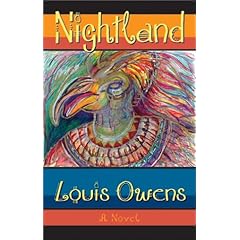Louis Owens and John Steinbeck’s Ghosts
A mystery solved with the help of a professor and a mobster’s musician
By Tony Ortega
Six years ago this summer, the Native American novelist Louis Owens drove his pickup truck to Albuquerque’s airport and parked.
 It had been some years since I’d spent much time with him. We’d stopped sending letters and e-mails. I don’t know how long he’d been depressed or why. Recognition for his novels was growing—he won the American Book Award in 1997—but he never seemed entirely satisfied with them. He was also somewhat restless about the universities where he taught, and had moved away from the University of California at Santa Cruz, where I’d met him, after amassing a following of fanatically admiring students. In 2002, he was splitting time between his job at UC Davis and a home in New Mexico, where he had once taught and where his wife and daughters lived. Was that it? Was it loneliness? Or the sense of failure that seemed to dog him, even as his fame was growing? One of his oldest friends has written that Louis was suffering from the effects of antidepressants at the same time that
It had been some years since I’d spent much time with him. We’d stopped sending letters and e-mails. I don’t know how long he’d been depressed or why. Recognition for his novels was growing—he won the American Book Award in 1997—but he never seemed entirely satisfied with them. He was also somewhat restless about the universities where he taught, and had moved away from the University of California at Santa Cruz, where I’d met him, after amassing a following of fanatically admiring students. In 2002, he was splitting time between his job at UC Davis and a home in New Mexico, where he had once taught and where his wife and daughters lived. Was that it? Was it loneliness? Or the sense of failure that seemed to dog him, even as his fame was growing? One of his oldest friends has written that Louis was suffering from the effects of antidepressants at the same time that 
I really don’t know what was in his mind as Louis pulled out a pistol there in his pickup truck, aimed it at his chest, and pulled the trigger.
He died at a hospital the next day. He had just turned 54.
I was shocked and angry when I heard about it from another former student…. Louis had challenged me to investigate a question that he’d wondered about for a long time. Why, he asked, had Steinbeck turned the mostly Mexican workers of the Great Cotton Strike of 1933 into a bunch of white Okies in his strike novel, In Dubious Battle?
